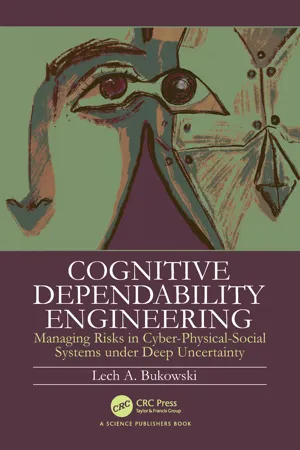
eBook - ePub
Cognitive Dependability Engineering
Managing Risks in Cyber-Physical-Social Systems under Deep Uncertainty
- 302 pages
- English
- ePUB (mobile friendly)
- Available on iOS & Android
eBook - ePub
Cognitive Dependability Engineering
Managing Risks in Cyber-Physical-Social Systems under Deep Uncertainty
About this book
The work is a context-oriented analysis and synthesis of complex engineered systems to ensure continuous and safe operations under conditions of uncertainty. The book is divided in four parts, the first one comprises an overview of the development of systems engineering: starting with basics of Systems Science and Single Systems Engineering, through System of Systems Engineering to Cognitive Systems Engineering. The Cognitive Systems Engineering model was based on the concept of imperfect knowledge acquisition and management. The second part shows the evolutionary character of the dependability concept over the last fifty years. Beginning from simple models based on the classical probability theory, through the concepts of tolerating faults, as well as resilience engineering, we come to the assumptions of Cognitive Dependability Engineering (CDE), based on the concept of continuous smart operation, both under normal and abnormal conditions. The subject of the next part is analysis and synthesis of Cyber-Physical-Social (CPS) Systems. The methodology consists of the following steps: modeling CPS systems' structure, simulating their behavior in changing conditions and in situations of disruptions, and finally assessing the dependability of the entire system based on CDE. The last part of the work answers the question of how to deal with risks in CPS systems in situations of high level of uncertainty. The concept of a Cognitive Digital Twin was introduced to support the process of solving complex problems by experts, and on this basis a framework for cognitive dependability based problemsolving in CPS Systems operating under deep uncertainty was developed. The possibilities and purposefulness of using this framework have been demonstrated with three practical examples of disasters that have happened in the past and have been thoroughly analyzed.
Frequently asked questions
Yes, you can cancel anytime from the Subscription tab in your account settings on the Perlego website. Your subscription will stay active until the end of your current billing period. Learn how to cancel your subscription.
No, books cannot be downloaded as external files, such as PDFs, for use outside of Perlego. However, you can download books within the Perlego app for offline reading on mobile or tablet. Learn more here.
Perlego offers two plans: Essential and Complete
- Essential is ideal for learners and professionals who enjoy exploring a wide range of subjects. Access the Essential Library with 800,000+ trusted titles and best-sellers across business, personal growth, and the humanities. Includes unlimited reading time and Standard Read Aloud voice.
- Complete: Perfect for advanced learners and researchers needing full, unrestricted access. Unlock 1.4M+ books across hundreds of subjects, including academic and specialized titles. The Complete Plan also includes advanced features like Premium Read Aloud and Research Assistant.
We are an online textbook subscription service, where you can get access to an entire online library for less than the price of a single book per month. With over 1 million books across 1000+ topics, we’ve got you covered! Learn more here.
Look out for the read-aloud symbol on your next book to see if you can listen to it. The read-aloud tool reads text aloud for you, highlighting the text as it is being read. You can pause it, speed it up and slow it down. Learn more here.
Yes! You can use the Perlego app on both iOS or Android devices to read anytime, anywhere — even offline. Perfect for commutes or when you’re on the go.
Please note we cannot support devices running on iOS 13 and Android 7 or earlier. Learn more about using the app.
Please note we cannot support devices running on iOS 13 and Android 7 or earlier. Learn more about using the app.
Yes, you can access Cognitive Dependability Engineering by Lech Bukowski in PDF and/or ePUB format, as well as other popular books in Computer Science & Biology. We have over one million books available in our catalogue for you to explore.
Information
Table of contents
- Cover Page
- Title Page
- Copyright Page
- Dedication
- Acknowledgements
- Preface
- Contents
- List of Acronyms and Abbreviations
- Glossary
- 1. Introduction
- Part I. Development of Systems Engineering Concepts: From Single Systems Engineering to Cognitive Systems Engineering
- Part II. Concepts of Attribute-oriented Systems Engineering: From Reliability Engineering to Cognitive Dependability Engineering
- Part III. Modelling and Simulation the Operation of Cyber-PhysicalSocial Systems in a Risky Environment
- Part IV. Managing Risks in Cyber-PhysicalSocial Systems Under Deep Uncertainty
- Index